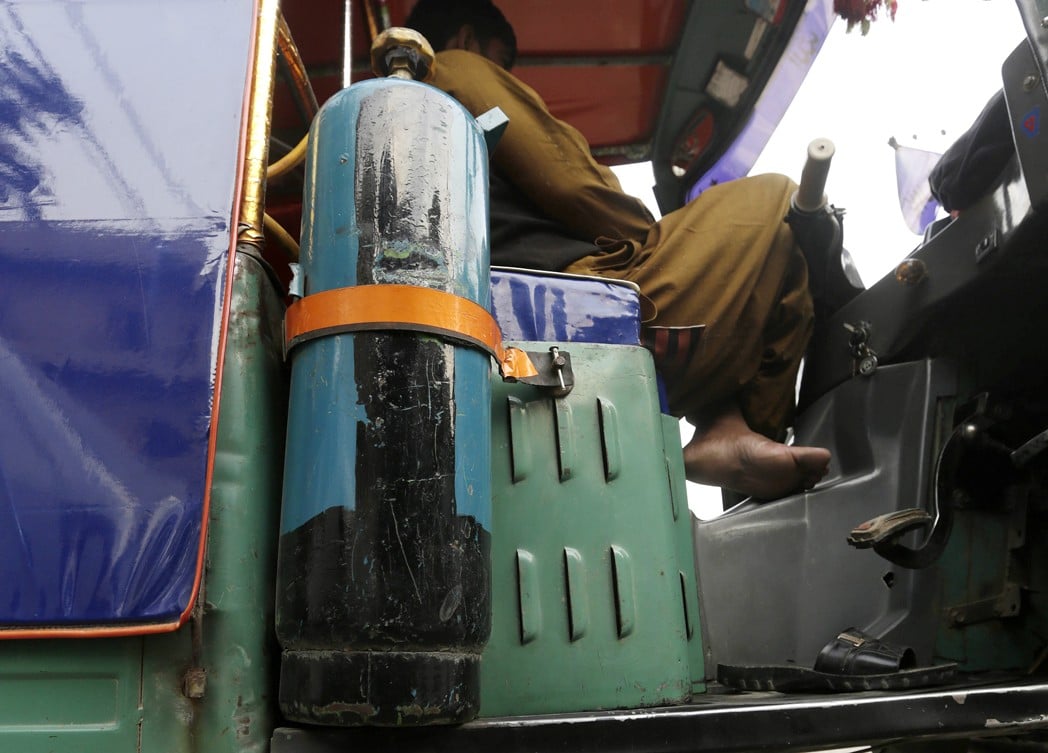
Incidents where a gas cylinder fitted in a rickshaw blew up have frequently occurred in the past. Yet, the vehicle drivers are willing to take the risk, in a bit to save more, as LPG is cost efficient

Rickshaws are a ‘phenomenon’ in our part of the world. The otherwise bustling traffic of Lahore can do precious little to push these eager, adamant vehicles from zigzagging their way through the streets and roads of the city.
Well, rickshaws aren’t an inexpensive public transport. And sure these cannot be classified as the safest, either. Nonetheless, these are efficient in their service.
Most rickshaws, especially the 4 stroke ones, come fitted with a Compressed Natural Gas (CNG) cylinder. However, when the shortage of the gas started, a few years back, many of these switched to another form of fuel -- Liquid Petroleum Gas (LPG). LPG is comparatively costly per kilogramme but it provides more mileage than CNG and petrol. As such, it comes cheap.
"LPG is cost-efficient," says Safdar Barki, a local rickshaw driver. "It gives you better mileage and is, therefore, a safe bet in the long run."
There is a flip side to it. Using LPG reduces the engine’s life. Besides, incidents of a gas cylinder blowing up have frequently occurred in the past. The rickshaw drivers seem to know all this but they are willing to take the risk, in a bit to save more.
The use of LPG in rickshaws as well as in one’s kitchen has raised many a question. They are seemingly prone to explosions. A recent incident occurred in Muslim Town where the gas cylinder in the rickshaw exploded, taking two lives.
Irfan Khokhar, President, LPG Association, believes it is the "cylinder that is of a crude quality not the fuel that causes such accidents."
Khokhar expresses surprise at the recent crackdown on the part of the Punjab Police against LPG shop owners, "We didn’t know it would come to this!"
However, he does not deny that "a meeting was planned to take place but the crackdown began before it should’ve."
According to him, there are approximately 3,000 shops in Lahore that deal in LPG, and about 150,000 vehicles using the gas.
Lytton Road is considered the hub of LPG vendors, along with Mozang and places such as Ferozpur Road. As LPG is highly inflammable and many local shops lack proper fire extinguishing facilities, there is a cause of concern.
The problem has worsened due to the rising number of unregistered LPG-run vehicles. The regulation of LPG cylinders is not possible in this situation.
As Safdar Barki puts it, "Explosions happen mainly if the cylinder has never been replaced or when a collision takes place."
Part of the problem lies in the practice of decanting which continues despite being declared as illegal. A number of LPG decanting shops are found in the busy neighbourhoods of the city.
According to Zahid Chaudhry, a senior journalist, "the rules for using LPG cylinders were laid down in the LPG Policy of 2006. However, awareness and implementation has become a huge issue with the rapid increase in the number of LPG vendors.
"The cylinders that were actually created for LPG are hardly in use today," he adds. "The reason for this is that these are specialised containers which are also expensive."
Chaudhry insists that whereas the use of CNG is allowed, LPG does not enjoy the same legal standing.
DIG Operations Haider Ashraf confirms that a crackdown has been initiated against unlicensed LPG vendors. The involvement of regional authorities in the matter shows the significance of the issue.
More than any vehicle, the rickshaws using LPG cylinders are the most deadly. "The cylinder fitted [in a rickshaw] is cheap in terms of quality and price," he says.
Even though District Regional Transport Authority (DRTA) was created to address the issue, nothing much has been done so far in the case of the LPG-run rickshaws.
In order to have securer rickshaws plying the city roads, some rules are yet to be made and implementation ensured. Associated authorities need to look into the matter. As a distressed rickshaw user says, "Illegal use or the use of incompatible LPG cylinders is certainly worrisome. I cannot believe that everyday I take a ride on an explosive transport."